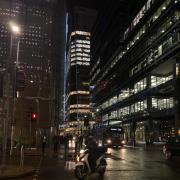
Once every 1000 years there seems to be an event that wipes out around 1/3 of the population. This alarming statistic is even more unsettling knowing research predicts that there is a 10% chance the human population will in fact die out completely by the end of the century. Understanding the horror of how vulnerable our species is, allows us to process the magnitude of these threats and the changes we have to make to ensure the next generation can still survive.
The BBC programme ‘Analysis’ presented by David Edmonds, considered the disturbing question ‘Will humans survive the century?’ The programme explored both the possibility of extinction and the perhaps more disturbing prospect of a slow demise of civilisation. The fact that there is no law that states we will make it through to the next century highlights the fragility of our world and our delusional sense of permanency.
The prospect of the world ending is an ancient understanding that is rooted in many cultures and faiths. Only recently have we adopted this stubborn refusal to recognise any problems and take responsibility. Karin Kuhlemann described these threats as ‘unsexy risks’ as their effects provoke a sense of guilt and fear. She focussed on the lack of natural resources, climate change and reduction of biodiversity being interconnected effects of overpopulation.
The dangers of nuclear war and artificial intelligence are perhaps more disconcerting however, as they have been cultivated directly by humans. The fast paced development of social media means there is no effective regulation of the content being promoted to the general public. With the active role it has played in recent political discussions, misinformation can give false legitimacy to globally influential decisions. The consequences are significant with social and economic divisions and repircussions becoming more prominent.
As part of our human nature, we possess a determination to thrive, a quality that has allowed us to survive for so many centuries. In response to these existential risks, research has been dedicated to explore how we can overcome or prevent these issues. These suggestions include; how to keep future machines under our control, adopting an alternative diet following a potential nuclear winter and geoengineering techniques of slowly releasing dust into the atmosphere. A more radical response to overpopulation was discussed by Karin Kuhlemann who suggested remaining childless. She argued for a change in the tax system to make it economically more challenging to raise a child, encouraging society to revaluate family norms and to see life as a privilege rather than an entitlement. Although the ethical stance is questionable, she reasoned it would be “difficult to explain to child why I put them on this world.”
Year 12 student Emily Bowden attended the climate change march on Friday 15th March in an attempt to hold government to account on these pressing environmental issues. Over 15,000 young adults chose to strike from school, demanding the government to shift itsfocus from political games to protecting the environment. There was outrage with the children being told they were neglecting their education without a sufficient cause. However, Emily reasoned that is the reverse, arguing, ‘I respect my education’ and the invaluable lessons it teaches of ‘striving for betterment’ convinced her to contribute. She observed that ‘the outpouring of frustration from young people can no longer be ignored’, urging politicians to acknowledge the responsibly they have to this generation. The appeal for change was echoed globally with thousands of children taking to the streets to signify an end to the dismissal of climate change.
Considering the magnitude of what’s at stake, the lack of awareness of the fragility of our species is appalling. Comparative to developments in plastic surgery or technology, the distribution of time and money into existential risk is significantly small. Ironically it is the human tendency to be drawn to short term triumphs which is why we have these problems initially. Yet there is a growing sense of urgency, especially among the younger generation, to somehow improve the world either environmentally, economically or politically. As Jackie Kennedy famously stated ‘we should all do something to right the wrongs we see and not just complain about them’.
Ishana Seward, City of London Freemen’s School































